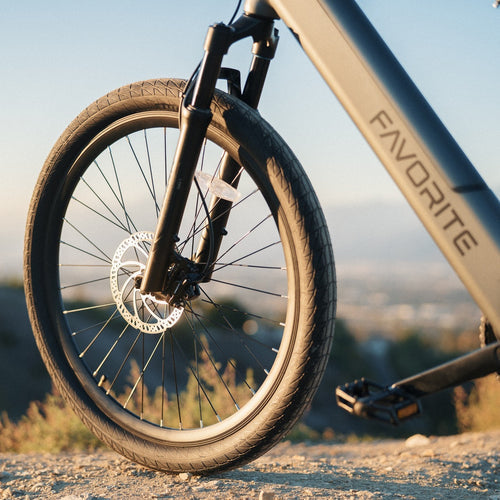
How to Avoid Flat Tires and Keep Your Rides Smooth
Table of Contents
Every cyclist dreads the moment they feel their bike wobble, only to discover the culprit—a flat tire. While a flat can derail your ride, it’s not inevitable. With a bit of foresight and these practical tips, you can dramatically reduce your chances of encountering this common problem and enjoy more uninterrupted rides.
Ride Defensively to Avoid Hazards
The best way to avoid a flat is to steer clear of what causes them. By riding defensively, you can minimize your exposure to potential hazards:
- Avoid the Gutter: Roads funnel sharp debris—glass, nails, screws—into the gutter. Stick to the main lane or bike paths to reduce your risk.
- Watch for Construction Zones: Stray hardware is common in construction-heavy areas, so avoid these zones whenever possible.
- Steer Clear of Sparkles: Shards of glass often catch the light. If you see something shiny on the ground, treat it as a warning and avoid it.
- Beware of Hidden Dangers: Puddles can obscure sharp objects, and wet leaves might hide jagged debris. If in doubt, bypass them altogether.
Maintain Proper Tire Pressure
Correct tire pressure is your first line of defense against flats. Underinflated tires are particularly vulnerable to two types of flats:
- Pinch Flats: These occur when the tube is pinched between the rim and a hard surface, such as a pothole or rock.
- Puncture Flats: Low pressure makes it easier for sharp objects to penetrate the tire and tube.
To prevent these:
- Check PSI Regularly: Use a bike tire gauge to ensure your tires are inflated to the manufacturer’s recommended PSI. For the FavoriteBikes Hybrid CSC Bike tires, we suggests an inflation range of 30-40 PSI (2.0-3.5 BAR).
- Top Off Weekly: Tire pressure naturally decreases over time. Refill every 1–2 weeks for optimal performance.
- Don’t Overinflate: While underinflation is a risk, too much air pressure can reduce traction and increase your chances of slipping, so aim for the sweet spot.
Inspect Your Tires Before and After Rides
Regular tire inspections can help you catch potential problems before they cause a flat.
- Scan for Debris: Look for embedded objects like glass shards, nails, or small stones. Remove them promptly using a sharp blade, dental pick, or needle-nose pliers.
- Check Tread and Sidewalls: If the casing threads are visible or the tread looks worn, it’s time to replace the tire. A fresh tire offers better protection against punctures.
Pro Tip: Don’t ignore small punctures in the outer tire. Left unchecked, they can deepen over time and lead to a flat.
Know When to Replace Your Tires
Even with the best care, tires wear out eventually. Signs it’s time to swap in a new one include:
- Bald Tread: A smooth, worn tread is more prone to slipping and punctures.
- Cracked Sidewalls: Cracks indicate the rubber is aging and losing its durability.
- Frequent Flats: If you’re experiencing more flats than usual, your tire may no longer be up to the task.
Replacing a tire proactively saves you the hassle of dealing with a flat mid-ride and keeps your bike performing at its best.
Bonus Tips to Reduce Flat Risk
- Invest in Quality Tires: Puncture-resistant tires are worth the extra cost, especially for commuters or off-road enthusiasts.
- Use Tire Liners or Sealant: These create an additional barrier against sharp objects, reducing your flat risk.
- Carry a Repair Kit: Even with precautions, flats happen. Having a patch kit, spare tube, and portable pump ensures you’re ready for the unexpected.
Flat tires may be a cyclist’s nightmare, but they’re far from unavoidable. By staying proactive with tire maintenance, riding smart, and knowing when to upgrade your equipment, you can significantly reduce the chances of your rides being interrupted by a dreaded flat.
No comments










0 comments